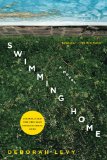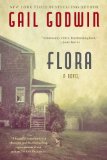Summary | Excerpt | Reviews | Beyond the book | Read-Alikes | Genres & Themes | Author Bio

 Book Reviewed by:
Book Reviewed by:
Naomi Benaron
Buy This Book
Reading Deborah Levy's Swimming Home is as unsettling as skating across a thinly frozen pond. You know you will fall through, tumbling into the deep, murky waters below the story's surface, but you are never sure exactly when or how. Levy sets her novel, which spans merely eight days - Saturday to Saturday - in a tourist villa shared by two couples in the Alpes-Maritimes. Against the backdrop of this clichéd and innocuous setting, she spins a richly plotted, darkly humorous, and disturbing tale of psychological unraveling. Levy's characters swim rather than skate, but the water into which they dive is no less turbulent.
Staying at the villa are the aging, philandering poet Joseph Jacobs, his war correspondent wife Isabel, and their fourteen-year-old daughter, Nina, who stands at the edge of her sexuality in a cherry-print bikini. Joe has a past, tied to his Holocaust-era childhood in Poland, that he wants to forget. Isabel records catastrophes "to try and make people remember." Also at the villa are their friends Mitch and Laura, who have a London emporium where they sell antique Asian weapons and expensive African jewelry. They have "come to the Alpes-Maritimes to escape from the futility of mending broken glass," which is literally, the shop windows that keep getting smashed in break-ins and figuratively, their splintering marriage and finances hurtling toward total ruin. Laura spends her time trying to keep her life together. Mitch has an insatiable appetite, expensive tastes, and shoots animals as a way to avoid facing his.
There is a circus-like cast of side characters including Jurgen, the perpetually stoned hippie caretaker, his sidekick Claude, Mick Jagger look-alike and owner of a local café, and Madeleine Sheridan, an elderly English physician who spies on the villa from her balcony. There are also cameo appearances by a three-foot high rubber alien and a hashish-dealing accordion player.
And then there is red-haired Kitty Finch, anorexic, mad, and beautiful, a self-proclaimed botanist with green-painted fingernails. She first appears naked in the villa's swimming pool, and it soon becomes clear that she is stalking Joe the poet because she has written a poem she wants to show him, and because she believes his poetry is a conversation with her. "He writes about things I often think," she tells Isabel. "We are in nerve contact."
Kitty Finch, predatory as a cat and fragile as a bird, is the lit fuse at the novel's center. "Standing next to Kitty Finch was like being near a cork that had just popped out of a bottle. The first pop when gasses escape and everything is sprinkled for one second with something intoxicating." Isabel, despite - or perhaps because - she understands that her husband will sleep with Kitty Finch, invites her to stay in the spare bedroom. Upon hearing the invitation, Laura thinks:
The young woman was a window waiting to be climbed through. A window that she guessed was a little broken anyway. She couldn't be sure of this, but it seemed to her that Joe Jacobs had already wedged his foot into the crack and his wife had helped him.
In that moment, the die is cast. Kitty will stay. From there, she spins the characters in wild and dangerous directions. She drives the plot toward its inevitable and unexpected conclusion.
The novel's title was inspired by John Cheever's short story "The Swimmer," in which Neddy Merrill decides to swim home from a pool party after he notices, "with a cartographer's eye, that string of swimming pools, that quasi-subterranean stream that curved across the country." Of the parallels, Deborah Levy told The Guardian's Kate Kellaway, "I was intrigued by the subtle, almost transcendental ways Cheever managed to conceal and reveal a state of mind." For Levy, profoundly influenced by the work of Sigmund Freud (her interpretations of two of his case studies were dramatized for the BBC), those streams are the conscious and unconscious repressions of her characters, and they provide the currents that propel Swimming Home forward.
Two central images wind through the novel. The first is a brief, dream-like chapter entitled, A mountain Road. Midnight. It is the first chapter of the novel, and it begins:
When Kitty Finch took her hand off the steering wheel and told him she loved him, he no longer knew if she was threatening him or having a conversation. Her silk dress was falling off her shoulders as she bent to the steering wheel. A rabbit ran across the road and the car swerved.
Chronologically, the scene takes place at the end of the week, and yet the strands of the story keep looping back to that scene on a mountain road, the lines unfolding on themselves in slightly different iterations, the backstory revealing more and more of their meaning, the tension ramping up with every repetition.
The second recurrent image is the swimming pool on the villa's property. The descriptions are subtly disturbing, neither the pool nor the scene quite what one expects. The chronological story begins with the swimming pool's description:
The swimming pool in the grounds of the tourist villa was more like a pond than the languid blue pools in the holiday brochure. A pond in the shape of a rectangle, carved from stone by a family of Italian stonecutters living in Antibes … A battered yellow lilo knocked against the mossy sides, scattering the bees that were in various stages of dying in the water.
And there is something else in the pool in that first scene: a body. The body is not a bear, as Joseph wonders casually, but Kitty Finch, "swimming naked under the water. She was on her stomach, both arms stretched out like a starfish, her long hair floating like seaweed at the sides of her body."
From there, the pool morphs into a ritual bath for Nina's first menstruation, an annoyance for Jurgen, who must continually fix the faulty underwater lights, a place of comfort for Kitty, and for Joseph, a symbol of death, a, "grave filled with water." The pool, too, is a metaphor for that primal watery home, that place of peace, toward which we are always swimming but will never, the novel seems to say, reach. On the mountain road, at midnight, Kitty Finch tells Joseph Jacobs:
I know what you're thinking. Life is only worth living because we hope it will get better and we'll all get home safely. But you tried and you did not get home safely. You did not get home at all. That is why I am here, Joseph. I have come to France to save you from your thoughts.
As a work of prose, Swimming Home, in length somewhere between novel and novella, defies categorization. Levy originally trained in the dramatic arts. Now she writes plays, fiction, and poetry. All those talents are in evidence here. Swimming Home is tightly plotted and highly cinematic. Levy's language is stunning, poetic, and necessary; every image, every paragraph carefully and judiciously placed. The book is part thriller, part literary fiction, part character study, and all its own original, iconoclastic work. Short-listed for the Man Booker Prize and the Jewish Quarterly Wingate Prize, Swimming Home is not a casual read. As Francine Prose states in her New York Times review, "Swimming Home should be read with care." It should be read as a plunge through the ice's smooth surface into the deepest recesses of the human psyche, a plunge from which the reader will emerge both changed and enriched.
![]() This review
first ran in the January 9, 2013
issue of BookBrowse Recommends.
This review
first ran in the January 9, 2013
issue of BookBrowse Recommends.

If you liked Swimming Home, try these:

by Gail Godwin
Published 2014
Flora is a novel as word-perfect and taut as an Alice Munro short story; like Munro, Godwin has flawlessly depicted the kind of fatalistic situation we can encounter in our youth — one that utterly robs us of our childhood and steers the course for our adult lives.

by Tan Twan Eng
Published 2012
Malaya, 1951. Yun Ling Teoh, the scarred lone survivor of a brutal Japanese wartime camp, seeks solace among the jungle-fringed tea plantations of Cameron Highlands. There she discovers Yugiri, the only Japanese garden in Malaya, and its owner and creator, the enigmatic Aritomo, exiled former gardener of the emperor of Japan.





The Flower Sisters
by Michelle Collins Anderson
From the new Fannie Flagg of the Ozarks, a richly-woven story of family, forgiveness, and reinvention.

The House on Biscayne Bay
by Chanel Cleeton
As death stalks a gothic mansion in Miami, the lives of two women intertwine as the past and present collide.

The Funeral Cryer by Wenyan Lu
Debut novelist Wenyan Lu brings us this witty yet profound story about one woman's midlife reawakening in contemporary rural China.
Your guide toexceptional books
BookBrowse seeks out and recommends the best in contemporary fiction and nonfiction—books that not only engage and entertain but also deepen our understanding of ourselves and the world around us.